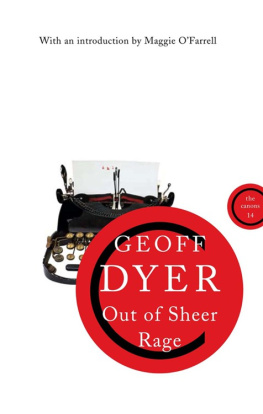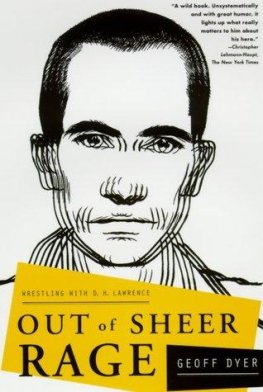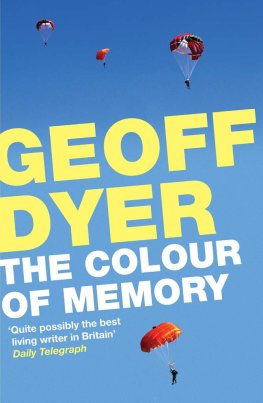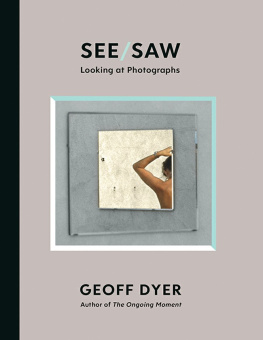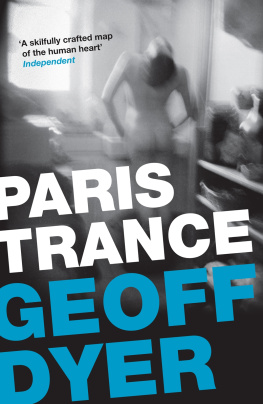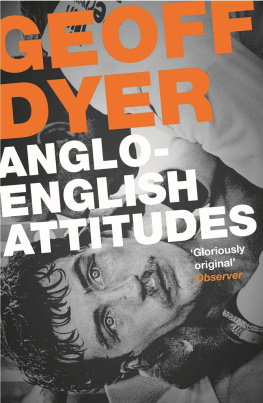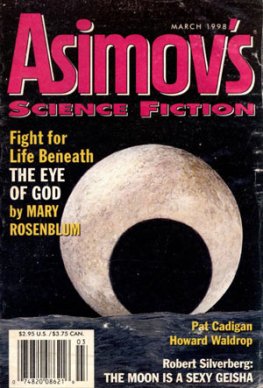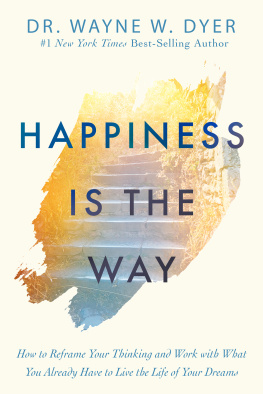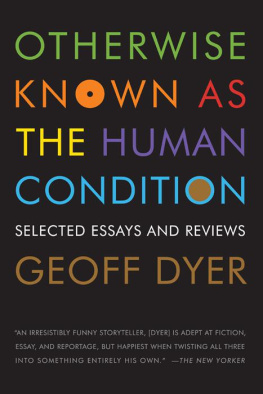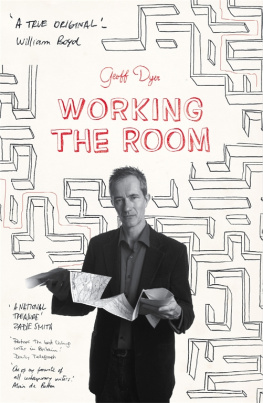Also by Geoff Dyer
Zona
Working the Room: Essays and Reviews 19992010
Jeff in Venice, Death in Varanasi
The Ongoing Moment
Yoga for People Who Cant Be Bothered to Do It
Anglo-English Attitudes: Essays, Reviews and Misadventures 198499
Paris Trance
The Missing of the Somme
But Beautiful
The Colour of Memory
Ways of Telling: The Work of John Berger

This edition published in Great Britain in 2012 by
Canongate Books, 14 High Street, Edinburgh, EH1 1TE
www.canongate.tv
This digital edition first published by Canongate in 2012
Copyright Geoff Dyer, 1997
Introduction copyright Maggie OFarrell, 2012
The moral rights of the authors have been asserted
First published in Great Britain in 1997 by
Little, Brown and Company
Grateful acknowledgement is made to the following for their kind permission to reproduce copyright material: Laurence Pollinger Limited and the Estate of Frieda Lawrence Ravagli for quotations from the works and letters of D. H. Lawrence; Farrar, Straus and Giroux Inc. for the excerpt from Question of Travel in The Complete Poems 1927-1979 by Elizabeth Bishop; copyright 1979, 1983 by Alice Helen Methfessel; and to Jeremy Reed for the quotation from The Return.
The Canons editorial board: Ailah Ahmed, Jamie Byng, Liz Calder, Geoff Dyer, Nick Lezard, John Seaton and Erica Wagner
British Library Cataloguing-in-Publication Data
A catalogue record for this book is available on request from the British Library
ISBN 978 0 85786 234 1
eISBN: 978 0 85786 339 3
Typeset in Goudy by Palimpsest Book Production Ltd, Falkirk, Stirlingshire
INTRODUCTION
by Maggie OFarrell
I considered, briefly, writing this introduction as an homage to Geoff Dyer. I toyed with the idea of delivering a thousand words or so about how I tried, again and again, to get started on my study of Dyer; how much I loved the book and was inspired by it; how I was itching to get down on paper my thoughts but I couldnt decide where to write it or which pen to use or which copy of the book to work from...
This book is both a paean to and a lament about procrastination. Geoff Dyer has taken this most writerly of problems and elevated it to an art form: the result is Out of Sheer Rage.
It opens with a juxtaposition of two male writers faced with work problems. First, in the epigraph, we get D. H. Lawrence: Out of sheer rage, he writes, Ive begun my book on Thomas Hardy. It will be about anything but Thomas Hardy... Two pages later, Geoff Dyer begins: Looking back it seems, on the one hand, hard to believe that I could have wasted so much time, could have exhausted myself so utterly, wondering when I was going to begin my study of D. H. Lawrence...
Out of Sheer Rage would seem, in its initial pages, to be about writers obsessions with other writers and all the passions and frustrations such obsessions carry with them. But, as with all of Dyers work, nothing is quite what it seems. One of the hardest things, Ive found, when pressing this book upon people because it is one of those you want to give to others with an evangelical, proselytising zeal is explaining what exactly it is. Is it a novel, recipients of my insistent gift will ask? A memoir? Literary criticism? Or is it biography? All of them, I say, and yet none of them.
Therein lies the joy. Dyer is the master of genre-dodging. His books are escapologists, every one, constantly slipping the chains of definition. And the greatest, the Houdini of them all, is Out of Sheer Rage.
It purports to be about a man perhaps Dyer himself, perhaps a fictional avatar or perhaps neither who is trying to apply himself to a sober, academic study of D. H. Lawrence. He is looking for a task intended to make me pull myself together and this Lawrence study is it, if only he could make a start. If only he could apply himself. If only hed brought the right copy of Lawrences letters with him. If only he could decide the best place to live: Paris, San Francisco, New York, New Orleans, Oxford? He moves to Rome and as soon as he does, decides he must immediately leave for Greece.
Dyer evokes with painful accuracy the life of the writer. He is meticulous in cataloguing the distractions, meanders, blind alleys, neuroses, paranoias and anxieties attendant on anyone who writes for a living. Throughout the course of the book, we witness Dyer travelling to Lawrences birthplace and numerous former homes; his pilgrimages take him from New Mexico to Sicily to Eastwood. He exchanges asides with his witty girlfriend, Laura, who is apparently more than happy to join in the Lawrence trail. He reads biographies and letters, he files photographs and he takes notes. Copious notes. Many, many notes. So many notes, in fact, that he begins to suspect that taking notes about Lawrence [was] a way of putting off writing...
Along the way, we get digressions both intellectual and personal. Out of Sheer Rage is a multi-layered, polymorphous book. Dyer weaves together elements of Lawrences biography, his reflections on Lawrence, his own travel experiences and autobiographical details, as well as numerous detours into subjects as diverse as British television schedules, a telephone-obsessed Sicilian and the numerous ailments Dyer is prey to. Dyer effects these slips between registers seamlessly. There might be a page or two about Rilke or Camus or the state of the novel and then you turn over and find an account of the particular challenges of sex after a road accident or the young Dyer trying to teach himself the piano while his grandmother coughed upstairs: She was dying of lung cancer but no one wanted to say the word cancer.
Then there are the tempers. Oh, the tempers. As the title suggests, tantrums form the backbone of this book, they pepper every chapter, they pull us through the pages. They are glorious in their abundance, comforting in their regularity, spectacular in their eloquence. A thwarted two-year-old has nothing on Dyer. His rants aim themselves at targets as diverse as seafood and the difficulties of its consumption, the dubbing in Italian cinemas, the challenges of acquiring the right sort of cornetti integrali, people who have children, the malign weight of a Nikon camera, the utter futility of home improvement and my particular favourite literary theorists: this group of wankers huddled in a circle, backs turned to the world so that no one would see them pulling each other off. Its unsurprising, then, towards the end of the book, that Dyer confesses, what I like most about Lawrence is his temper... his inexhaustible irritability.
Its oxymoronic conceit, a book written about a man unable to write a book, is just one of the things that makes Out of Sheer Rage funny. Did I mention it was funny? Howlingly, screamingly funny. Depression might lurk around the corners of this text, the narrator might be caught in a terrible web of his own indecision and the whole book might be a serious attempt to redefine the parameters of literary biography, but Steve Martin said it is the funniest book Ive ever read and Im inclined to agree with him.
This is, in a sense, a study of failure, but in Dyers hands failure undergoes an alchemical change. Out of Sheer Rage is about the topography of inability, the mismatch between ambition and achievement and the glorious result of that disjunction. The final oxymoron is Dyers ability to transmogrify failure into success, a success you are holding in your hands at this very moment: a quite brilliant book about the failure to write a book.
September 2011
Next page
